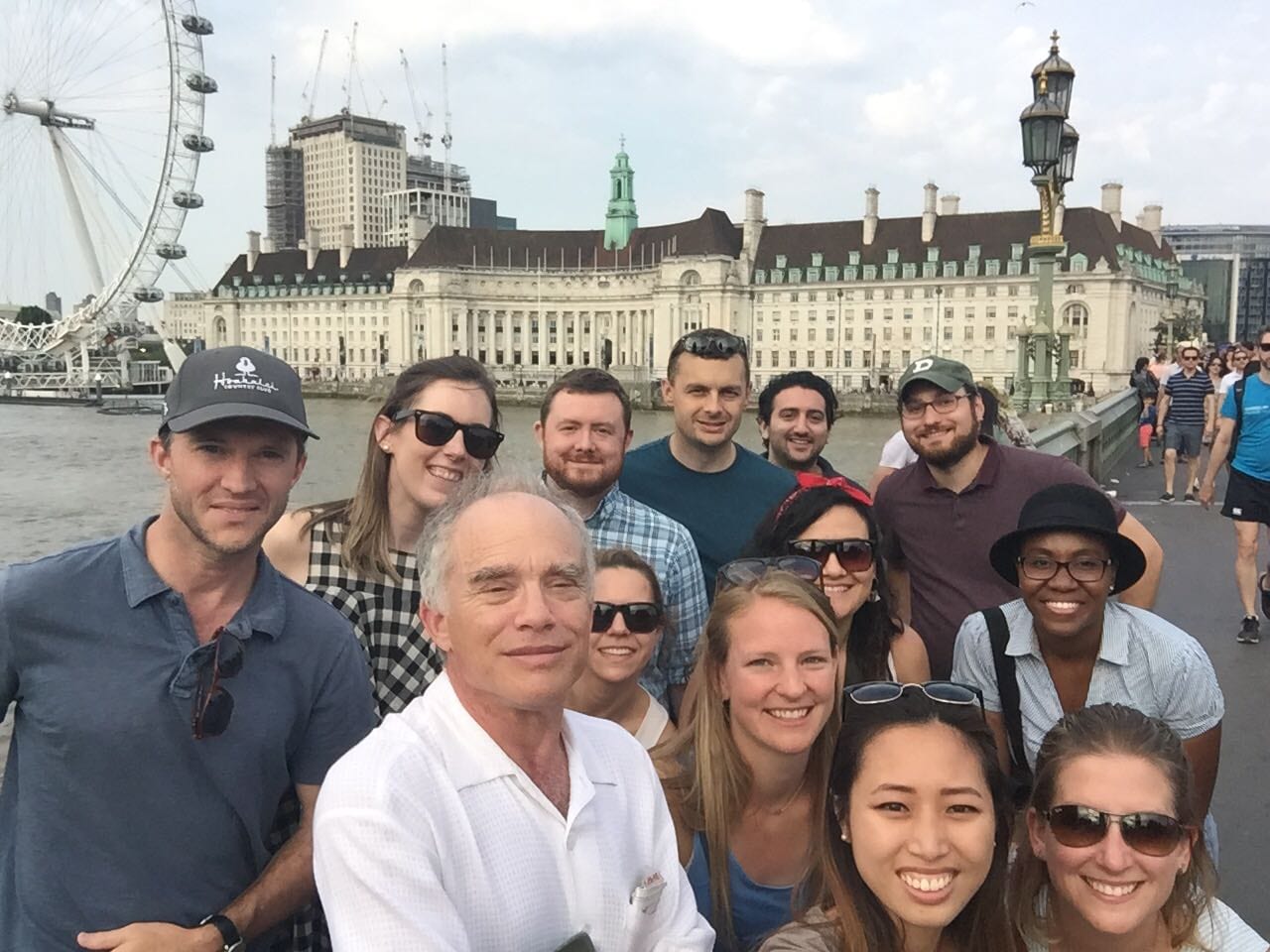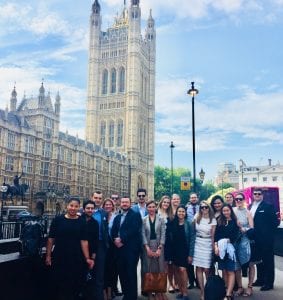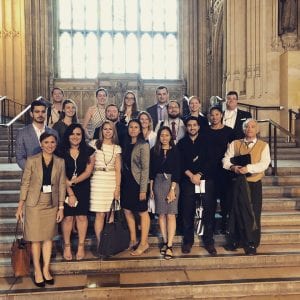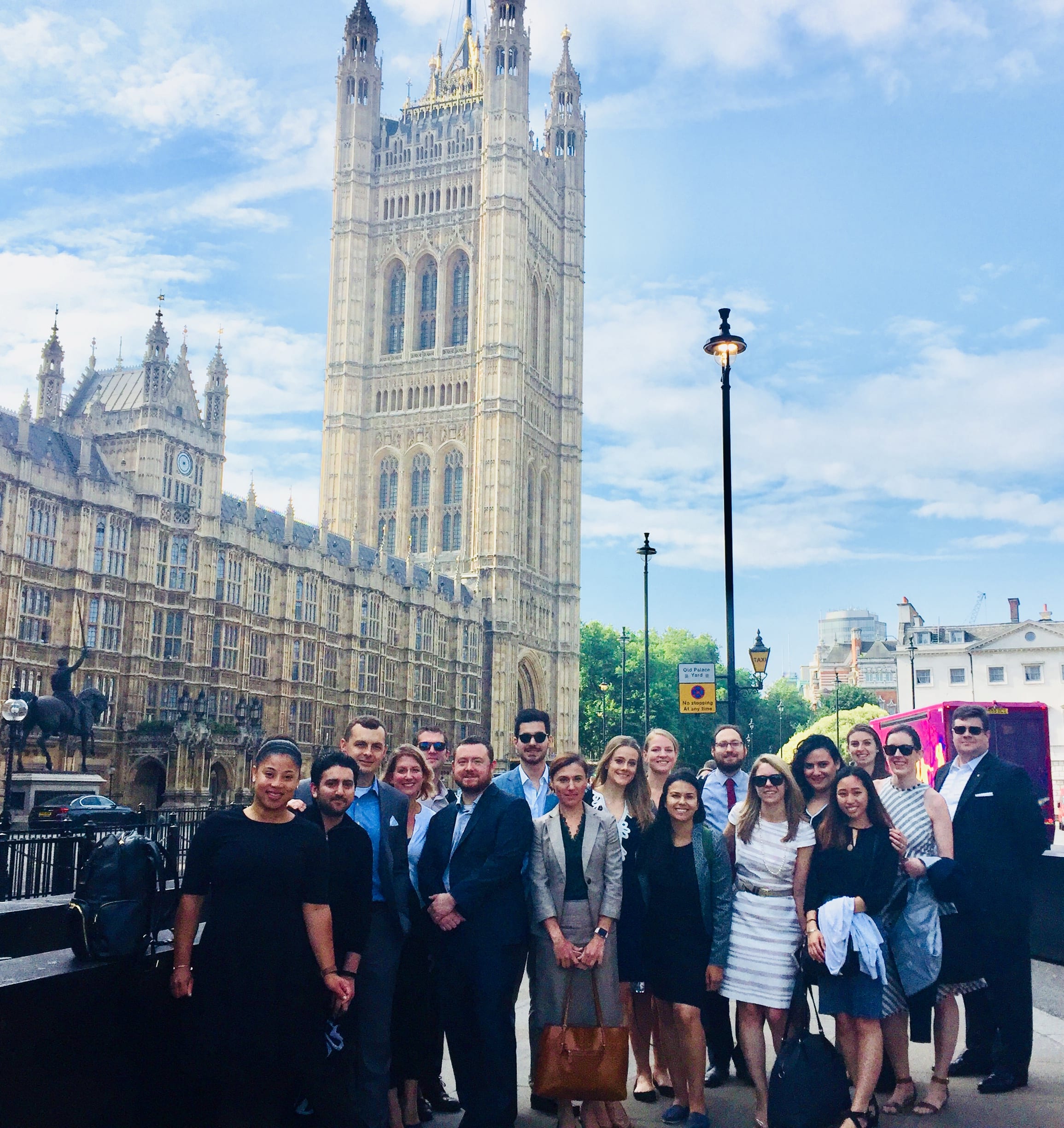Reflection by Luke Lisell, Professional Cohort MBA Class of 2018
Reflecting on the time that I spent in London while participating in the Privatization, Nationalization, and Public Private Partnerships study abroad course, I believe that I learned a great deal. Some of my previously held beliefs were reinforced by what I heard and saw on the trip, and overall, I found that conditions in the United Kingdom were different from my expectations based on our pre-trip studies. I was also pleasantly surprised by the high caliber of my fellow participants and the broad cross-section of backgrounds that they represented. Never at a loss for words or questions, I thought our group engaged well with each presenter and I enjoyed the Q&A sessions because I felt that we collectively drove the discussions forward with strong multi-disciplinary insights. I departed the United States expecting to hear full throated endorsements of Private Finance Initiatives (PFIs) and Public Private Partnerships (PPPs) from a series of experts engaged in fully exploiting and leveraging their possibilities. What I found instead was a pragmatic group of advisors and practitioners worried about public perception and political backlash. These individuals struggled at times to find artful ways to talk about public-private collaborations following years of negative coverage of failed projects in the national press.
As for individual presenters, I felt that Lieutenant Colonel Edward Waite-Roberts was an effective speaker and that his brief was beneficial at the beginning of the schedule. I appreciated the fact that he allocated time to give us deep background information on current British politics, Brexit, and the fallout from the Grenfell housing complex fire. I had specifically followed the international press coverage of the Grenfell tower fire last year, and incorrectly assumed that the incident was a distant memory for most members of the British public. What Lt. Col Wait-Robert’s expert analysis made me realize was that this remains a hot button topic and generally fit the narrative, in the press and in the minds of an outraged British public, of the two opposing forces battling for supremacy in a decades-long fight in post-privatization Britain. The first of these antagonists could be called the ‘greedy private sector’ consisting of business people who cut corners to ensure higher returns and the second character being public regulators frequently found to be falling down on the job and generally doing an inadequate job protecting public interests. I felt like this was very important context as we started our investigations into Privatization and Public Private Partnerships in the United Kingdom.
I also felt that Lord Jim Knight was a particularly interesting and effective speaker, and the luncheon at Osteria was an agreeable and appropriate setting to have a candid discussion. Lord Knight spent considerable time describing Brexit from the perspective of a senior Labour party politician, while tangentially explaining British political and educational structures that he correctly assessed to be difficult material for Americans to fully grasp. I found it fascinating that he counted the excesses of the Thatcher government and its aggressive privatization policies as the impetus for him to enter local politics in the late 1980’s. Fast forward to the early 2000’s, Lord Knight served in Tony Blair’s cabinet, as an undersecretary in the MoD during the early years of the Global War on Terror, in a Labour government with a strong track record of foreign military interventions and PFI deals. My instincts, based on US politics, would be that Lord Knight’s left-leaning Labour politics would be much less hawkish and more pro-international trade. What instead appears to be the case is that some members of his Labour party are the voices in British society that are pushing to roll back some past PPP and PFI deals that were cut during the early days of the Blair government as well as the re-nationalization of the rail system. This was an excellent illustration for me that local politics matter immensely for any party interested in executing long-term infrastructure or service delivery contracts with foreign governments. It is worth the effort to understand the local political environment but even that is not a bulletproof strategy as political winds may shift over time as illustrated by the current Labour government reversing some of its previous policies.


A third presentation that I felt was excellent was “Team Swansea” consisting of Labour Member of Parliament (MP) Carolyn Harris representing Swansea East and Professor Simon Brooks representing Swansea School of Management at Swansea University. MP Harris, besides being a gifted, natural orator with a profound sense of humor, did a wonderful job describing a very different corner of the United Kingdom than what we had come to expect during our tours of London and the wealthy surrounding counties. She painted a visceral picture of a post-industrial corner of Wales that was struggling to catch up after globalization shifted jobs out of the region. She and professor Brooks touched on the politics of devolution, the process designed in the late 1990’s to decentralize Great Britain’s government and give more power to the three nations which, together with England, makeup the UK. It was only after discussions with “Team Swansea” and others that I began to realize just how London centric and centrally controlled the UK governance was in the past and remains by many economic measures to this day. Wales only recently begun benefiting from the devolution policies, whereby it 1) retains greater control of tax revenues generated on its lands and 2) the locally elected Welsh Assembly appropriates those funds. Both speakers made it clear however that due to the relatively small population and industrial tax base of the country, public coiffures are insufficient to fund all the activities of local government. My impression following “Team Swansea’s” presentation was that, despite a consensus nationally that PFI’s and PPP’s had fallen out of favor among Labour party leadership, there is still a need for public private partnerships and private financing in public projects in Swansea and other similarly affected municipalities. In a chicken and egg fashion, post-industrial corners of the UK are looking for investment in public infrastructure to attract knowledge workers, entrepreneurs, and the companies that will help them climb out of the economic doldrums and begin a virtuous cycle of investment. At present however, PPPs and PFIs or versions thereof appear to be one of the few vehicles available to these rural communities that lack sufficient internal means to self-finance critical infrastructure and services.
I think that Professor David Newbery’s lecture would have been even more beneficial at an earlier position on the schedule. I thought he did an excellent job outlining the history of privatization in the United Kingdom, providing some UK specific context to the entire Privatization and Public Private Partnership discussion, and explaining the British vision of privatizing and restructuring. He carefully walked us through a case study of the network utility privatization and the structural remedies that they emplaced to create competition where feasible, and regulation to mimic competition where not. This would’ve been good context to have going into our meeting with the Office of Rail and Road (ORR). The gentlemen at ORR did a marvelous job explaining the intricacies of their job and were more than generous with their time, but the entire discussion would’ve been more effective if we had previously sat through professor Newbery’s lecture.
During our time in Winchester City, while touring the grounds of the beautiful Winchester Cathedral and the 13th century “public” school located within the constellation of outlying buildings, Lieutenant Colonel Edward Waite-Roberts said something that struck me. He commented that, “Just when you think you begin to understand this country, it will surprise you.” He was referring to the English practice of using the term “public” school to refer to the nation’s oldest, most prestigious, expensive, and exclusive learning institutions. I believe that a larger argument could be made, however regarding Britain and the United States’ understanding of each other. While the two countries appear to have very similar cultures with a long-shared history, there remains a significant gulf of understanding separating the two nations and their people. In my humble opinion, it was very helpful and beneficial to spend time touring and speaking with British advisors and practitioners of Privatization, Nationalization, and Public Private Partnerships to bridge this gap, albeit in a very specific quarter. As I mentioned in the intro, some of my previously held beliefs were reinforced by what I heard and saw, but overall, I found that conditions in the United Kingdom were quite different than what I had expected to find based on our pre-trip studies and my personal pre-formed ideas. My colleagues’ strong multi-disciplinary insights aided me immensely in breaking through some of these tricky cultural and historical distortions and ultimately, I would fully endorse this trip to any MBA student who had interest in public private collaboration.















